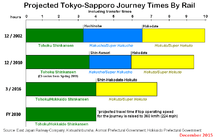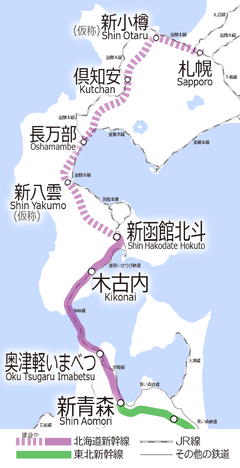Hokkaido Shinkansen
| Hokkaido Shinkansen | |||
|---|---|---|---|
|
| |||
|
An H5 series Shinkansen undergoing testing in November 2015 | |||
| Overview | |||
| Native name | 北海道新幹線 | ||
| Type | Shinkansen | ||
| Status | Operational | ||
| Locale | Japan | ||
| Termini |
Shin-Aomori Shin-Hakodate-Hokuto | ||
| Stations | 4 | ||
| Operation | |||
| Opened | 26 March 2016 | ||
| Owner |
| ||
| Rolling stock | E5 series, H5 series | ||
| Technical | |||
| Line length | 148.9 km | ||
| Track gauge | 1,435 mm (4 ft 8 1⁄2 in) | ||
| Electrification | 25 kV AC, 50 Hz, overhead catenary | ||
| Operating speed |
260 km/h (160 mph) 140 km/h (85 mph) (through Seikan Tunnel) | ||
| |||

The Hokkaido Shinkansen (北海道新幹線 Hokkaidō Shinkansen) is a Japanese high-speed shinkansen rail line that links up with the Tōhoku Shinkansen in northern Aomori Prefecture in Honshu and continues on into the interior of Hokkaido through the undersea Seikan Tunnel. Construction started in May 2005, and the initial Shin-Aomori to Shin-Hakodate-Hokuto section opened on 26 March 2016.[1] Extension of the line to Sapporo is scheduled to open by March 2031.[2] The line is operated by the Hokkaido Railway Company (JR Hokkaido).[3]
Associated actions
In preparation for the opening of the Hokkaido Shinkansen, the Seikan Tunnel (Kaikyō Line) and associated approaches (approximately 82 km in total[2]) were converted to dual gauge, with both the Shinkansen 1,435 mm (4 ft 8 1⁄2 in) standard and 1,067 mm (3 ft 6 in) narrow gauge tracks.[4]
Upon the opening of the Shinkansen line the section of the conventional (narrow gauge) Esashi Line approximately paralleling the same route between Goryōkaku and Kikonai was transferred from the control of JR Hokkaido to a newly established third-sector railway operating company, South Hokkaido Railway Company, becoming the Isaribi Line.[5]
Operations
Service types
Two train service types operate on the Hokkaido Shinkansen: limited-stop Hayabusa services between Tokyo or Sendai and Shin-Hakodate-Hokuto, and semi-fast Hayate services between Morioka or Shin-Aomori and Shin-Hakodate-Hokuto.
Under the initial timetable, ten return Hayabusa services operate daily between Tokyo and Shin-Hakodate-Hokuto and one return service operates daily between Shin-Aomori and Shin-Hakodate-Hokuto. One return Hayate service operates daily between Morioka and Shin-Hakodate-Hokuto, and one return service daily operates between Shin-Aomori and Shin-Hakodate-Hokuto.[6]
Operating speed
At present the maximum speed on the approximately 82 km dual-gauge section (including through the Seikan Tunnel) is 140 km/h (85 mph).[2] There are approximately 50 freight trains utilising the dual-gauge section each day, so limiting the travel of such trains to times outside of Shinkansen services is not an option. Because of this and other weather-related factors cited by JR East and JR Hokkaido, the fastest journey time between Tokyo and Shin-Hakodate-Hokuto is currently 4 hours, 2 minutes.[7] The new section takes 61 minutes from Shin-Aomori to Shin-Hakodate-Hokuto on the fastest services.[7]
By 2018, it is proposed to allow one Shinkansen service each day to travel at 260 km/h (160 mph) (the maximum speed proposed for the tunnel) by ensuring no freight trains are scheduled to travel on the dual-gauge section at that time. To achieve the full benefit of Shinkansen trains travelling on the dual-gauge section at 260 km/h (160 mph), other alternatives are being considered, such as a system to automatically slow Shinkansen trains down to 200 km/h (125 mph) when passing narrow-gauge trains, and loading freight trains onto special "Train on Train" standard-gauge trains (akin to a covered piggyback flatcar train) built to withstand the shock wave of oncoming Shinkansen trains traveling at full speed. This would enable a travel time from Tokyo to Shin-Hakodate-Hokuto of 3 hours and 45 minutes.
Stations
| Station name | Japanese | Distance (km) | Transfers | Location | |
|---|---|---|---|---|---|
| Opened 26 March 2016 | |||||
| Shin-Aomori | 新青森 | 0.0 | Ōu Main Line, | Aomori | Aomori |
| Okutsugaru-Imabetsu | 奥津軽いまべつ | 38.5 | Tsugaru Line (Tsugaru-Futamata) Tsugaru-Kaikyō Line | Imabetsu | |
| Seikan Tunnel | |||||
| Kikonai | 木古内 | 113.3 | South Hokkaido Railway Line, Kaikyō Line | Kikonai | Hokkaido |
| Shin-Hakodate-Hokuto | 新函館北斗 | 148.9 | Hakodate Main Line | Hokuto | |
| Under construction. Scheduled to open during fiscal year 2030 | |||||
| Shin-Yakumo[* 1] | 新八雲 | 203.0 | Yakumo | Hokkaido | |
| Oshamambe | 長万部 | 236.1 | Hakodate Main Line, Muroran Main Line | Oshamambe | |
| Kutchan | 倶知安 | 290.2 | Hakodate Main Line | Kutchan | |
| Shin-Otaru[* 1] | 新小樽 | 328.2 | Otaru | ||
| Sapporo | 札幌 | 360.2 | Chitose Line, Hakodate Main Line, Sasshō Line (Gakuen-Toshi Line) Namboku Line, Tōhō Line | Kita-ku, Sapporo | |
Rolling stock
All services are formed of 10-car JR East E5 or JR Hokkaido H5 series trainsets.[6]
In February 2014, JR Hokkaido placed an order for four 10-car H5 Series Shinkansen trainsets for use on Hokkaido Shinkansen services from March 2016.[8] Based on the E5 series trainsets operated by JR East since 2011, the order for 40 vehicles cost approximately 18 billion yen.[8] The first two sets of the order are scheduled to be delivered to Hakodate Depot by road from Hakodate Port in October 2014, with test running commencing before the end of the year.[9] The remaining two sets on order are scheduled to be delivered in 2015.[9] The vehicles feature the usual upper green and lower white livery, with a purple stripe in the middle. The color purple was chosen to represent the purple flowers of Hokkaido: lilacs, lupine and lavender. Inside, the ordinary-class cars feature wood paneling and carpet with a snowflake motif. Business class features cream-colored walls representing the local dairy industry and carpet with a drift-ice motif. Gran class features dark blue carpets, said to be modeled after the shimmering lakes and bodies of water along the route.[10]
- A JR East E5 series train
- A JR Hokkaido H5 series train in March 2016
History
In the early 1970s, two other Shinkansen routes were proposed for Hokkaido: Sapporo - Asahikawa (Hokkaido Shinkansen extension) and Oshamambe - Muroran – Sapporo (Hokkaido South Route). There were also further unofficial plans to connect to Abashiri, Kushiro, and Nayoro/Wakkanai. These plans have been indefinitely shelved.
On 1 November 2014, a ceremony was held at Kikonai Station to mark the completion of track-laying for the line between Shin-Aomori and Shin-Hakodate-Hokuto.[11]
Test-running on the Hokkaido Shinkansen tracks within Hokkaido commenced from 1 December 2014, initially at low speeds, with the speed due to be raised to the maximum of 260 km/h later during the month.[12] Test-running was extended through the Seikan Tunnel to Oku-Tsugaru-Imabetsu in December 2014.[13] Test-running south of Oku-Tsugaru-Imabetsu commenced on 21 April 2015, with the first train reaching Shin-Aomori Station from the north in the early hours of 24 May.[13]
Future plans
JR Hokkaido is extending the Hokkaido Shinkansen from Shin-Hakodate-Hokuto to Sapporo, planned to open by March 2031.[2] Tunneling work on the 5,265 m (3.272 mi) Murayama tunnel, situated about 1 kilometre (0.62 mi) north of Shin-Hakodate-Hokuto station commenced in March 2015, and is scheduled to be completed by March 2021. The 211.3 km extension will be approximately 76% in tunnels, including major tunnels such as Oshima (26.5 km), Teine (18.8 km) and Shiribeshi (18 km).[14]
If Hokkaido Shinkansen services are ultimately able to be operated at speeds of up to 360 km/h (225 mph), the estimated journey time from Tokyo to Sapporo will be 5 hours and 1 minute.[15]
References
- ↑ 北海道新幹線開業は来年3月26日 JRが最終調整 [Hokkaido Shinkansen to open on 26 March next year - JR Hokkaido makes final adjustments]. Doshin (in Japanese). Japan: The Hokkaido Shimbun Press. 12 August 2015. Archived from the original on 2015-08-12. Retrieved 12 August 2015.
- 1 2 3 4 Sato, Yoshihiko (16 February 2016). "Hokkaido Shinkansen prepares for launch". International Railway Journal. Simmons-Boardman Publishing Inc. Retrieved 6 April 2016.
- ↑ "DPJ may OK three new bullet-train sections". The Japan Times. Japan: The Japan Times Ltd. 17 December 2011. p. 1. Retrieved 22 September 2014.
- ↑ "First Shinkansen train through the Seikan Tunnel". Railway Gazette. 26 May 2015. Retrieved 26 May 2015.
- ↑ 道南いさりび鉄道、ロゴマークを発表…津軽海峡をモチーフ [South Hokkaido Railway Company unveils logo - Tsugaru Straits motif]. Response (in Japanese). Japan: IID Inc. 23 March 2015. Retrieved 24 March 2015.
- 1 2 北海道新幹線 新青森~新函館北斗間開業に伴う運行計画の概要について [Details of operations following opening of Hokkaido Shinkansen between Sendai and Shin-Hakodate-Hokuto] (PDF). News release (in Japanese). Japan: East Japan Railway Company. 16 September 2015. Retrieved 16 September 2015.
- 1 2 Nakada, Ayako (4 December 2015). "Bullet train linking Tokyo and Hokkaido unable to hit sub 4-hour target". ajw.asahi.com. Asahi Shimbun. Retrieved 4 December 2015.
- 1 2 北海道新幹線「H5系」、内装には雪の結晶も [Hokkaido Shinkansen "H5 series" - Interiors to feature snowflake design]. Yomiuri Online (in Japanese). Japan: The Yomiuri Shimbun. 16 April 2014. Archived from the original on 15 April 2014. Retrieved 16 April 2014.
- 1 2 北海道新幹線車両、函館港に10月陸揚げ 今年まず20両、基地へ陸送 [Hokkaido Shinkansen trains to arrive at Hakodate Port in October with 20 vehicles delivered to depot this year]. Doshin Web (in Japanese). Japan: The Hokkaido Shimbun Press. 19 March 2014. Archived from the original on 18 March 2014. Retrieved 19 March 2014.
- ↑ Special Preview: Hokkaido Shinkansen - Hopes and Challenges. NHK. 25 February 2016. Event occurs at 5:00. Archived from the original on 29 February 2016. Retrieved 28 February 2016.
- ↑ 北海道新幹線(新青森・新函館北斗間)レール締結式の開催について [Hokkaido Shinkansen rail joining ceremony] (PDF). Press release (in Japanese). Japan: Japan Railway Construction, Transport and Technology Agency. 19 September 2014. Retrieved 22 September 2014.
- ↑ Suzuki, Katsuichi (1 December 2014). 北海道新幹線:試験走行始まる 下旬には260キロで [Hokkaido Shinkansen test running starts - 260 km/h by early December]. Mainichi Shimbun (in Japanese). Japan: The Mainichi Newspapers. Archived from the original on 1 December 2014. Retrieved 1 December 2014.
- 1 2 北海道新幹線の試験走行、新青森駅に初乗り入れ [Hokkaido Shinkansen test-running reaches Shin-Aomori Station for the first time]. Asahi Shimbun Digital (in Japanese). Japan: The Asahi Shimbun Company. 24 May 2015. Retrieved 24 May 2015.
- ↑ http://www.mlit.go.jp/common/000215188.pdf
- ↑ Press, Jiji. "Shinkansen to get 3 new sections". Daily Yomiuri Online. The Yomiuri Shimbun. Archived from the original on 7 July 2012. Retrieved 22 September 2014.
External links
| Wikimedia Commons has media related to Hokkaido Shinkansen. |
- JR Hokkaido (in Japanese)
- Federation of Hokkaido Chamber of Commerce and Industry (in Japanese)



